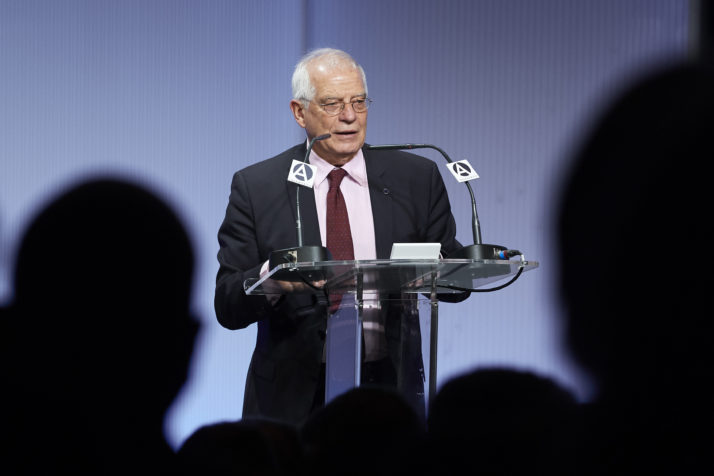The European Union is rolling out a red carpet for Iranian Foreign Minister Mohammad Javad Zarif, amid rising fears of potential war in the Middle East.
The EU’s diplomatic service said in a statement Sunday that foreign policy chief Josep Borrell had issued a personal invitation to Zarif to visit Brussels — in a phone call on the same day that U.S. President Donald Trump threatened to bomb Iran amid escalating tensions between Tehran and Washington.
The invitation risks further antagonizing senior U.S. officials who have complained that European allies have not shown sufficient support for the U.S. after Trump ordered the killing of a senior Iranian general, Qassem Soleimani, and Iran’s supreme leader, Ali Khamenei, vowed „severe“ retaliation.
In the Sunday statement, the EU said Borrell had spoken with Zarif by phone and urged „de-escalation of tension in the region“ while also stressing „the importance of preserving“ the Iran nuclear agreement that many officials and diplomats have said is all but dead, and likely impossible to salvage given the current tensions.
The statement also said Borrell had „expressed his deep concern about the latest increase of violent confrontations in Iraq, including the killing of General Qassem Soleimani.“
The Borrell-Zarif phone conversation came amid frantic consultations in Brussels and other diplomatic capitals as officials struggled to keep up with the break-neck pace of political developments in the Middle East.
While Borrell described his telephone conversation in a tweet on Saturday, he did not initially mention that he had extended a personal invitation for Zarif to visit Brussels. The Iranian foreign ministry did not immediately say whether it would accept the invitation, though it acknowledged the conversation with Borrell as part of a flurry of contacts between Zarif and his diplomatic counterparts over the weekend.
The Borrell-Zarif phone conversation came amid frantic consultations in Brussels and other diplomatic capitals as officials struggled to keep up with the break-neck pace of political developments in the Middle East.
In Baghdad, Iraq’s parliament on Sunday voted to urge its government to expel the U.S. military from the country — a move that would end the 17-year presence of American troops that began with the invasion ordered by President George W. Bush in March 2003.
The departure of U.S. troops from Iraq would severely complicate the ongoing fight against ISIS. On Sunday, the U.S.-led international coalition against the Islamic State issued a statement saying it was suspending all operations against the group to focus on protecting bases that house coalition forces given Iran’s threats of retribution.

The EU’s statement signals that Borrell intends to maintain one clear role for the EU, which is as the coordinator of efforts to preserve the Iran nuclear deal, known as the Joint Comprehensive Plan of Action Carlos Alvarez/Getty Images
In a speech to parliament before Sunday’s vote, Iraq’s acting Prime Minister Adel Abdul Mahdi branded the killing of Soleimani a „political assassination“ and reiterated his own call for the expulsion of U.S. forces in the name of preserving Iraqi „sovereignty,“ regional news media reported.
European Commission President Ursula von der Leyen has declared that she will lead a „geopolitical“ Commission and has expressed aspirations to raise the EU’s profile on the global stage. But the recent events in the Middle East have only underscored how the bloc remains largely a bystander when it comes to such major geopolitical conflagrations — left watching and waiting for the actions of military powers such as the U.S. and Russia, and with few options for concrete steps of its own.
The EU’s statement signals that Borrell intends to maintain one clear role for the EU, which is as the coordinator of efforts to preserve the Iran nuclear deal, known as the Joint Comprehensive Plan of Action or JCPOA.
Trump’s unilateral withdrawal from JCPOA in May 2018 is widely seen as the starting point in a series of events that led to the current hostilities. Trump and his administration have argued that the JCPOA, under which Iran agreed to curtail its nuclear program in exchange for sanctions relief, merely gave the Iranian regime added financing and political breathing space to continue a policy of bloody military meddling throughout the Middle East, and that it is Iran’s continuing support for state-sponsored terrorism that is the root cause of any conflict.
According to the EU statement, Borrell in his Saturday night conversation with Zarif „urged Iran to exercise restraint and carefully consider any reaction to avoid further escalation, which harms the entire region and its people.“
According to the EU statement, Borrell in his Saturday night conversation with Zarif „urged Iran to exercise restraint and carefully consider any reaction to avoid further escalation, which harms the entire region and its people.“
„The High Representative offered his full engagement to contribute to de-escalation,“ the statement said. „He stressed that ultimately, a regional political solution was the only way forward and that the EU was ready to support this.“
The EU also reiterated its strong support for the JCPOA, calling it „a corner stone of the global nuclear non-proliferation architecture and instrumental for the security of the region and the world.“
„The High Representative confirmed his resolve to continue to fully play his role as coordinator and keep the unity of the remaining participants in support of the agreement and its full implementation by all parties,“ the statement said.
Source: politico.com
See more here: news365.stream






